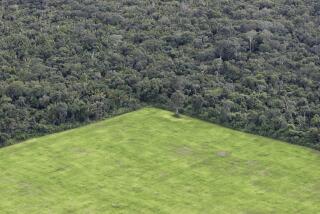Panama Urges Action on Regional Peace
PANAMA CITY — President Nicolas Ardito Barletta of Panama on Thursday urged the foreign ministers of five Central American nations to resolve their differences and get together on a regional peace treaty, which four Latin nations calling themselves the Contadora Group have been trying to bring about by mediation since January, 1983.
“The eyes of the peoples of Central America, of the Contadora Group, of Latin America and the rest of the world are fixed on the meeting here today,” Ardito Barletta told the opening session of new talks among top diplomats of the Contadora Group and of the five Central American states.
He said that a treaty proposal drafted last September has been mired in “a series of fundamental concerns over the national security of each country, respect for borders as well as security and military concerns.”
Last year, Nicaragua’s Sandinista government agreed to sign the September draft, which was prepared by the Contadora four--Mexico, Colombia, Panama and Venezuela. But, with moral support from the United States, three of the other four countries--El Salvador, Honduras and Costa Rica--rejected the draft on two major grounds:
--As drawn, those provisions of the draft treaty most sought after by Nicaragua would have gone into effect immediately upon signing, while those provisions most wanted by the others would not have gone into effect until after ratification, something that might never occur.
--Provisions of the draft treaty regulating the balance of military forces in Central America and those concerned with border security and treaty verification were considered deficient.
The fourth nation, Guatemala, took a neutral stance publicly on the treaty draft, but privately its spokesmen said that Guatemala will sign no treaty that allows Nicaragua to maintain a military establishment larger than those of each of the other four Central American nations.
In his speech, Ardito Barletta referred to the kidnaping Tuesday of the daughter of President Jose Napoleon Duarte of El Salvador, saying that it shows “once again the dramatic and negative effects of terrorism to which we all want to put an end.”
He said events that have aggravated friction among Central American states have helped to stall the peace process, an apparent reference to a series of border and diplomatic disputes between Nicaragua and Costa Rica and between Nicaragua and Honduras.
‘Bring Us Closer’
The Panamanian leader urged the foreign ministers to make the meeting here “a definitive moment in bringing us closer to the signing of a peace pact.”
His comments echoed recent statements by Contadora officials, who said the current meeting will be crucial for the survival of the Contadora process.
Before entering the closed-door meetings, Nicaraguan Foreign Minister Miguel D’Escoto accused the United States of frustrating Contadora’s work by putting pressure on its allies in the region.
During the two-day meeting, the nine representatives are expected to discuss ways to keep border areas safe, control the arms buildup in the region and build cooperation among opposition groups within each country.
More to Read
Sign up for Essential California
The most important California stories and recommendations in your inbox every morning.
You may occasionally receive promotional content from the Los Angeles Times.










